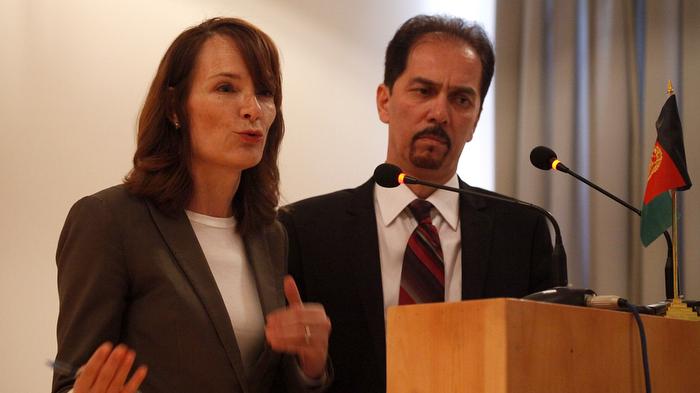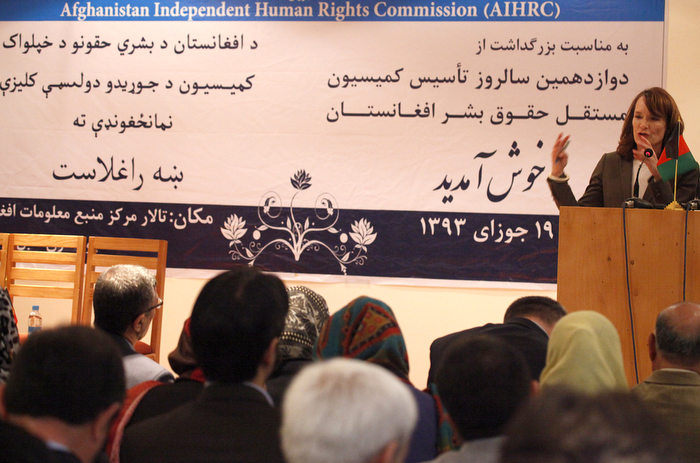KABUL - A United Nations human rights official today called on human rights and Afghan civil society organizations to monitor and assist the government to meet its legal obligations to protect the rights of all Afghans in line with the international conventions and treaties the government has ratified.“Civil society has a vital role to play in keeping government in check, to monitor and expose what the government is doing right and is not doing right to protect human rights,” said the Director of Human Rights at the UN Assistance Mission in Afghanistan (UNAMA), Georgette Gagnon, in comments at an event today in Kabul marking the 12th anniversary of the establishment of the Afghanistan Independent Human Rights Commission (AIHRC).
The AIHRC was established on 6 June 2002 and is responsible for promotion, protection and monitoring human rights in the country.
Afghanistan is a party to many human rights conventions and treaties including the Convention on the Elimination of All Forms of Discrimination against Women and the Convention Against Torture, which oblige the Afghan Government to meet important legal obligations to protect the rights of all Afghans.
The UN official said that although there are good laws on paper in Afghanistan and the government has taken some steps to implement them, she called on the government and human rights activists to ask themselves “what has really changed for Afghans on the ground.”
She underlined that it is the government’s obligation to take all necessary measures to protect the rights of people and promote the rule of law.
The UNAMA head of human rights emphasized that the Afghan Government should report its progress through the international monitoring mechanism on its performance regarding its obligations under the international treaties it has ratified.
“There are recommendations that UN treaty bodies make to the government to help it promote and do better on human rights protection,” said Ms. Gagnon.
She also stressed the need for universities to offer courses and training on international conventions and treaties and the government’s obligations under these laws to raise awareness of human rights issues among the youth.
“Universities in many countries now have specific faculties and courses, including Sharia faculties, that focus on international human rights including its fundamental principles of Islam and other religious tenets,” said Ms. Gagnon.
Earlier, she lauded the AIHRC’s “commitment, bravery and constant efforts” to promote the rights of all Afghans across the country.
“At UNAMA we have called on the government and certain ministries to ensure that the human rights commission retains its current high status under the international accreditation framework which shows how important and well the commission is doing its job,” said Ms. Gagnon. “We have urged the sitting government to do what needs to be done to make sure the commission retains the highest status and we will be calling on the new leadership to do that as well.”
UN human rights officials have previously voiced their concerns on the process of appointment of new commissioners at the AIHRC. During her visit to Kabul last September, the UN human rights chief, Navi Pillay, warned that there are “real concerns” that the process was “sufficiently flawed” for it to lose its ‘A’ status under the Paris Principles, an international peer-run system of accreditation for national human rights bodies, which now exist in more than 100 states worldwide.
The International Coordinating Committee (ICC), the international body that reviews the compliance of national human rights institutions worldwide with international standards, is due to hold its re-accreditation review of the AIHRC in November 2014.
Earlier today, in her opening remarks at the Kabul event, the chairperson of the AIHRC, Sima Samar, highlighted human rights challenges in Afghanistan. She cited lack of women’s access to education and health facilities, poor economic conditions and lack of women’s access to political and government’s positions as the “key hindrances” to protecting women’s rights in the country.
“We have achieved a lot but still we have a long way to go when it comes to human rights in Afghanistan,” said Ms. Samar.
Related articles:
- PRESS RELEASE: UNAMA urges support for Afghan electoral bodies and human rights commission
- UN human rights chief: Afghanistan at a ‘critical juncture,’ more effort needed to preserve gains







